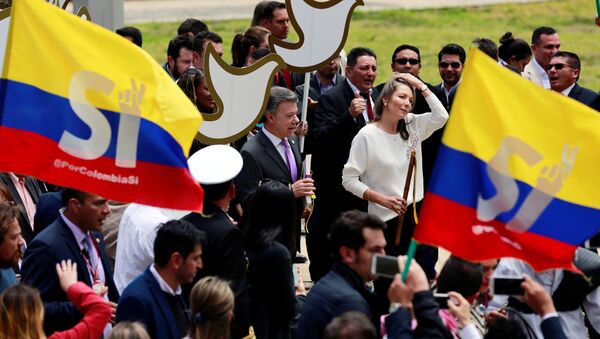Colombia: Peace Pact a Key Opportunity to Curb Abuses https://t.co/guMvSvxJv3
— Human Rights Watch (@hrw) August 25, 2016
In Syria, the complex fighting between Daesh — also known as ISIL — the Syrian government and rebel forces may not have the hindsight of nearly 52 years of countless failures in negotiation such as those between the Colombian government and leaders of the Revolutionary Armed Forces of Colombia (FARC).
President Obama tweeted to show of solidarity with Colombia's current President Juan Manuel Santos, someone who when compared to previous Colombian President Alvaro Uribe's military strategy, has been much more open to moving towards the political participation of FARC leaders.
Felicitaciones, @JuanManSantos and Colombia. After decades of war, we stand with you in building a future of peace. https://t.co/haXJaqgS9f
— President Obama (@POTUS) August 25, 2016
Talked to #Colombia President @JuanManSantos as historic peace agreement reached. EU supports courage to make peace https://t.co/vPTsIhqDS0
— Federica Mogherini (@FedericaMog) August 25, 2016
"We are seeing the beginnings of peace talk negotiations with the likes of the Taliban in Afghanistan but this is only possible with the less militant factions as opposed to those whose only intention is to spread more chaos and violence to achieve their agendas," Dr. Julian Richards, an expert on Security and Intelligence Studies at Buckingham University told Sputnik.
A crucial factor even with FARC in Colombia who when faced with the realization that their goals would not be achieved militarily accepted the steps towards becoming part of the political process.
Previous rounds of peace talks had a number of aims outlined which was to look towards realistic goals in order to end the conflict and reach agreements on various aspects of politics and economics, and only then the next steps would be towards wider social transformation in the wake of the imminent peace deal now closer than ever.
It is worth noting that although much of the process has come as a result of decisions in Colombia, other countries such as Norway, Cuba, Venezuela and Chile have also provided an element of external mediation-style input which must be acknowledged. And so the sensitive role of the international communities and leaders is certainly key to finding peaceful resolves in other parts of the world.
An interesting, and rather unique aspect which has also significantly contributed to the process in Colombia, is the inclusion of victims from both sides of the long-standing bloody conflict, who have had the opportunity to give harrowing accounts of their experiences as a form of "healing" process.
This is certainly a unique factor which, when looking at wider situations, can certainly be given prime focus for resolve, however likely or possible this can be where the numbers are significantly higher and where the impact of bloody wars are so current and raw for those innocently caught up.
Oscar Palma, a professor of political science and government at the National University of Columbia is little more pragmatic about the deal however.
"This deal certainly brings all the conditions to believe we are able to construct something balanced for the future but it doesn't mean we will magically find daily peace. This is just a starting point," Palma told Sputnik.
"There are many other criminal gangs and insurgencies operating on the ground who are set on continuing the violence on the ground," he added.
The Peace Research Institute in Oslo (PRIO) has included President Santos and FARC guerrilla leader "Timochenko" Jimenez in their annual prediction list for a possible upcoming Nobel Peace Prize.
According to PRIO's current Directors, Kristian Berg Harpviken, the two leaders have displayed great political courage to end 50 plus years of civil war, leading toward where the outcome we see today. Harpviken also acknowledges that other bloody, complex conflicts could learn many lessons from this peace process, even if there are significant differences.
Q&A: Colombia Peace Deal Announced — What’s Next? https://t.co/VJZmpZelaV #AdiósALaGuerra #Colombia @usip
— Ginny Bouvier (@vmbouvier) August 25, 2016
In Colombia, the next hurdle is an upcoming referendum, with Santos leading his peaceful "Yes" vote and former President, leading the "No" campaign against FARC's political participation.
The positive factor that remains however, is that all sides have openly indicated that, whatever the outcome of a referendum aimed at securing public approval of a peace deal, there will be all efforts remaining to ensure there is no return to bloody wars.





